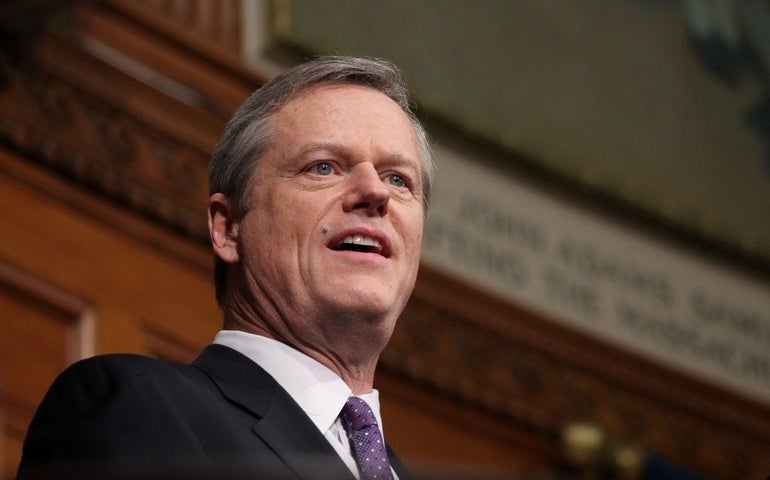State government is awash in surplus cash, so much so that the state savings account balance is surpassing $3 billion and Gov. Charlie Baker, who looms as a potential obstacle to tax increases, is now openly pressing the Legislature to deliver tax relief to Massachusetts residents.
As part of a plan to spend $648 million from the fiscal 2019 surplus, Baker on Friday proposed using $175 million over the next two years to pay for a doubling of the income tax exemption for dependents from $1,000 to $2,000, which would deliver tax relief to 1 million taxpayers worth $50 per dependent. In his letter to the Legislature, Baker described it as a “working families” tax cut.
The governor’s tax relief and spending proposal arrived a day after the state Department of Revenue reported collecting nearly $2 billion in August, which is one of the state’s lighter months for collections. That marked a nearly 8% spike in revenues, up $146 million from August 2018.
Playing defense against an expected push for tax increases, the Massachusetts High Tech Council recently noted that state tax collections surged by $4 billion in just the last two fiscal years and rose 58%, far outpacing inflation, over the decade ending in fiscal 2019.
In addition to raising questions about how he would receive tax increases, the governor’s proposal newly positions him as a tax cutter, in a year when all the talk from Beacon Hill Democrats has been about the best way to raise more money for education, transportation improvements and climate change mitigation. It faces an uncertain future at best, but adds another element for lawmakers trying to make a public case for higher taxes to a governor who has rhetorically discouraged tax hikes, but has also shown an openness at times to raising taxes and fees.
And legislators who favor raising the gas tax or other revenue generation ideas like congestion pricing will also need to explain why those proposals should advance at a time when a recession could be around the corner, or not.
Democrats are already moving forward with a $2 billion income surtax on the wealthy, and a new $800 million annual tax on businesses and employees is about to kick in Oct. 1 to finance the state’s new paid family and medical leave law.
House Speaker Robert DeLeo has forecast a fall debate in the House over transportation revenues. The debate is being driven by increased congestion all over eastern Massachusetts and rampant problems at the MBTA, which has been steadily raising its fares while delivering subpar service.
With more people viewing the transportation situation as a crisis, advocates are more optimistic that lawmakers are poised to act so that they can show the electorate that they’ve recognized the problems and taken steps to address them.
The Transportation for Massachusetts coalition is urging legislators to pass a five-point plan, in addition to the wealth surtax.
The plan calls for a 25-cent per gallon increase in the gas tax, congestion pricing on highways within Rte. 128, enabling regions to pass binding ballot proposals that address local needs, enacting a 6.25% fee on Uber and Lyft trips, and advancing a multi-state, cap-and-invest initiative to draw funds from the transportation sector to finance clean vehicle purchases, climate resiliency projects, and enhanced transit, biking and walking options statewide.

